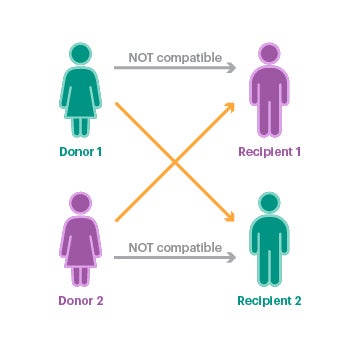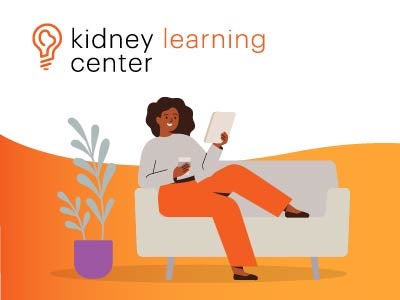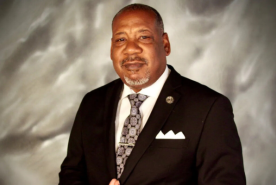Last updated: March 29, 2024
Medically reviewed by: NKF Patient Education Team
Living kidney donation allows a healthy person to donate one kidney. It offers benefits like a shorter wait and better match for the recipient.
Audio Summary of Becoming a Living Donor
This audio summary was created with AI, using the National Kidney Foundation content as the exclusive source. NKF clinical experts have reviewed it for accuracy.
Living Kidney Donation
Living kidney donation is when a healthy person donates one of their two kidneys while they are alive. Getting a kidney from a living donor has lots of benefits for the person who needs a transplant, called the recipient. If you are interested in donating a kidney, you will work with a transplant center at a hospital. The transplant center will make sure you are healthy enough to donate, do the surgery, and help you recover.
Who can be a living donor?
There are a few common requirements for people who are interested in living donation. You must be at least 18 years old. Some transplant centers require a donor to be 21 or even a little older. There are some medical conditions that could prevent you from being a living donor, including having uncontrolled high blood pressure, diabetes, or cancer. If you’re a smoker, you will most likely be asked to quit before being approved to donate. You should be honest with the team about your smoking habits to make sure that the donation and transplant are successful.
Each transplant center has slightly different requirements, so you should always let the transplant center decide who would be a good donor. If you are not approved as a living donor at one transplant center, you may be able to get evaluated at other centers who have different requirements.
Types of Living Donation: Directed and Non-directed
There are two types of living kidney donation:
- Directed Donation is when the donor names a specific person who will receive the kidney. It is the most common type of living donation. Directed donations are often between blood relatives, like parents, siblings, or children. They can also happen between people with close personal relationships, such as a spouse, friend, or coworker.
- Non-directed donation is when a person donates anonymously to someone in need. They usually do not have any kind of relationship with the person who gets their donated kidney. Other names for a non-directed donor include an altruistic or “good Samaritan” donor.
If you are planning to donate to someone you know directly, there is always a chance you will not be a good match. Maybe you and the recipient do not have blood types that work together, or there can be other factors that would not allow the transplant to be successful.
What if I'm not a match?
If you turn out not to be a good match, another option is a “paired exchange”. A paired exchange involves two pairs of living donors and their recipients. The two recipients “swap” donors so that each receives a kidney from the other person’s donor. If this is an option for you, your transplant team will coordinate the entire process, including finding the other matching pair.

Benefits
While there are no physical benefits for a living donor to donate a kidney, kidney transplant can save the life of someone with kidney failure. People with kidney failure who receive a transplant can live longer and enjoy life more, especially giving them freedom from staying on dialysis.
Getting a living donor transplant has several benefits for the recipient with kidney failure compared to getting a deceased donor transplant:
- A shorter wait – Having a living donor means the patient no longer has to wait on dialysis. If someone has kidney failure and can find a donor before they need to start dialysis, they may be able to get a preemptive transplant, meaning they don’t have to go on dialysis at all.
- A better match – Some living donor transplants are done between family members who are genetically similar, but you can be a great match with someone you are not related to. A better genetic match lessens the risk of rejection.
- Lasts longer - On average, a kidney from a living donor lasts about 15 to 20 years, compared to 7 to 10 years for a kidney from a deceased donor. Some will last longer; others will last less. Living donor kidneys also have a better chance at working right away than deceased donor kidneys.
- Better timing – With a living donor, it is possible to plan the surgery day and time at a good time for the pair and the transplant team. This way, both the kidney patient and their living donor can be at their healthiest.
Risks
Just like having any other surgery, there are risks involved with having a living donor surgery. Some short-term risks include:
- bleeding or getting an infection in the areas around the surgical area
- developing a hernia if you lift anything too heavy right after surgery
- getting a UTI, or Urinary Tract Infection. This can be caused from having a urinary catheter placed during surgery to allow your body to urinate while you're in surgery and under anesthesia
The transplant team will talk to you more about these and other potential long-term risks of donating a kidney during your evaluation.
Making the decision to donate
The transplant center will have a dedicated team just for your care during the evaluation and surgery. Their goal is to take care of your health and give you the support you need to make the best decision for you – whether that means you end up donating or not.
Donating a kidney is a very personal decision. You may want to talk to people you trust about your choice, including family or friends, no matter if you’re trying to donate to someone you have a relationship with or to someone you do not know. You should never feel any pressure to donate. It can be helpful to talk to living donors who’ve gone through the process for support or your faith leader to help you decide if living donation is right for you.
How to donate a kidney
If you’re interested in becoming a living donor, the first thing you'll have to do is contact a transplant center to get evaluated. If you have someone in mind who you’d like to donate to, you usually have to get evaluated at the same transplant center. If you don’t have someone in mind to donate to, then you can get evaluated at any transplant center to begin the process.
The costs for the donor directly related to the evaluation, surgery, and follow-up appointments are covered through your recipient’s health insurance, no matter who you donate to. There are some expenses not covered by health insurance, including pay for missing work, childcare, and travel expenses.
There are programs that can help you pay for these costs. Some people decide to have fundraisers to raise money for out-of-pocket expenses not covered by insurance. Talk to the transplant center to learn more about any programs they offer to support living donors.
After you’ve contacted a transplant center, you'll have a 1–2-day evaluation that includes meeting your living donor team and having tests done, including blood draws, urine samples, and imaging, like x-rays and CT scans.
Once you’re approved, you'll be scheduled for surgery at a good time for both you and your recipient. Your surgery will most likely be laparoscopic, meaning you'll have tiny incisions in your belly area to remove your kidney. Most donors only stay in the hospital after donating for about 1-2 nights.
It will take about 4-6 weeks to fully recover and get back to a normal, healthy life. You'll have follow-up appointments with the transplant team to make sure you're doing well and healing properly.
DECIDE TO DONATE
Contact a Transplant Center
- To donate to someone you know, reach out to their transplant center.
- To donate to anyone, contact any transplant center.
- You can change your mind at any time for any reason!
EVALUATION
Ensure You're Healthy Enough
- Lab work (blood and urine samples) to check your health and compatibility.
- Meet with the transplant team to discuss your physical and emotional health.
- Imaging (x-rays or CT scans) to check your kidneys' health.
SURGERY
In the Hospital
- Living donor surgery is laparoscopic, with small incisions or cuts around the belly area.
- Most donors stay in the hospital for 1-2 nights.
RECOVERY & FOLLOW UP
4 – 6 Weeks After Surgery
- You will have follow up appointments with the transplant team to check your health.
- Most donors make a full recovery and return to work, hobbies and physical activity.
Life After Donating a Kidney
Life after donating a kidney is very similar to life before donating a kidney!
- Kidney donors will not have a shorter life from donating their kidney. Research has shown that living kidney donors, of all ethnicities, have the same life expectancy, or live just as long, as people who don't donate.
- A female donor should wait between 6 months to 1 year after donation to become pregnant. The body needs time to recover from the surgery and to adjust to living with one kidney before pregnancy. You should talk with your doctor before becoming pregnant. There is a small risk for developing high blood pressure and other conditions related to pregnancy with one kidney, so you should make sure you receive proper prenatal care.
- Pain medicine is only needed for a short time after surgery. You will not have to take medicine for the rest of your life just because you donated a kidney. Your time on pain medicine right after surgery is decided between you and the transplant team.
- Donors do not have to follow a special diet after donating, but a healthy, balanced diet is recommended for anyone. Donors can still drink alcohol, in moderation.
- Donors should take special care of the kidney they have left, including protection during contact sports.
Questions to ask the living donor team
- What should I expect for my evaluation? How long does it usually take at your center?
- Is there parking validation (free parking) for my evaluation and surgery?
- Will I need someone to help me during and after, and what will they need to do?
- Are there any additional financial programs, either nationally or through the transplant center, that I qualify for (example: NLDAC, NKR Donor Shield, etc.?)
- Can I be connected with someone who has donated already at this center?
- What should I expect after I donate?












